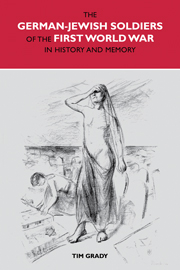Book contents
- Frontmatter
- Contents
- Acknowledgements
- List of Abbreviations
- Introduction
- 1 Dying: War, Mutilation and Mass Death, 1914–18
- 2 Mourning: Defeat, Revolution and Memorialisation, 1918–23
- 3 Commemorating: War Veterans, Ritual and Remembrance, 1923–29
- 4 Forgetting: Nazism, Front Fighters and Destruction, 1929–45
- 5 Discovering: War Victims, War Crimes and Reconstruction, 1945–60
- 6 Embracing: The Growth of Holocaust Awareness and Acknowledgement of the Jewish Soldiers, 1960–80
- Conclusion
- Bibliography
- Index
6 - Embracing: The Growth of Holocaust Awareness and Acknowledgement of the Jewish Soldiers, 1960–80
- Frontmatter
- Contents
- Acknowledgements
- List of Abbreviations
- Introduction
- 1 Dying: War, Mutilation and Mass Death, 1914–18
- 2 Mourning: Defeat, Revolution and Memorialisation, 1918–23
- 3 Commemorating: War Veterans, Ritual and Remembrance, 1923–29
- 4 Forgetting: Nazism, Front Fighters and Destruction, 1929–45
- 5 Discovering: War Victims, War Crimes and Reconstruction, 1945–60
- 6 Embracing: The Growth of Holocaust Awareness and Acknowledgement of the Jewish Soldiers, 1960–80
- Conclusion
- Bibliography
- Index
Summary
The appointment of the Social Democratic party leader Willy Brandt as Federal chancellor in 1969 was viewed by many as the start of ‘a new era for West Germany’. After the long period of conservative rule, broken only by the interregnum of the Great Coalition from 1966 to 1969, Brandt's appointment to the chancellorship appeared to mark a moment of genuine change. In many ways, though, this shift in political leadership merely provided the most visible indication, but certainly not the only sign, of the tremendous process of liberalisation that had taken place during the Federal Republic's short life. In a mere twenty years, West Germans had gone from living in the ruins of bombedout cities to enjoying the luxuries associated with a sustained economic boom. Perhaps more significantly, the two decades had also witnessed the gradual emergence of a democratic culture and a critical public sphere which allowed contemporary issues to be debated and contested.
On one level, the growing security and prosperity of the Federal Republic served to dissipate long-standing narratives of German victimhood. With the reconstruction of Germany's urban landscape, the release of the last prisoners of war from Soviet captivity and rising living standards, it became much harder for West Germans to continue to view themselves as a nation of victims. Instead, the well-publicised trials of Nazi-era crimes in Ulm in 1958, in Jerusalem in 1961 and in Frankfurt from 1963 to 1965 helped to place an ever greater focus on the Jewish victims and the central involvement of Germans in their suffering.
- Type
- Chapter
- Information
- Publisher: Liverpool University PressPrint publication year: 2011



